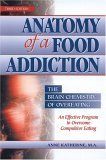I must admit, I have been under an extreme amount of stress for the past 2 weeks. I thought that I would take this opportunity to give you some information on how severe stress affects your appetite and hence your weight, in case you haven’t gone through this before.
This might not be the case for you, but when I am extremely stressed I lose my appetite. This past week I have only been able to eat minimal amounts of food, however I kept drinking a good deal of water. It is not a normal occurrence for me to lose my appetite and have no desire for food (hey, I’m overweight! 😉 ), which is a good indication of just how stressed I’ve been.
Something good has come out of this though, because I wanted to learn more about stress, food, and eating. I did some research in the book Anatomy of a Food Addiction: The Brain Chemistry of Overeating by Anne Katherine, M.A., and learned some very interesting information regarding your endorphins and stress.
Beta-endorphins are chemicals in your body that, depending on their present level, can stimulate fat, sugar, and starch eating. The level that your’s need to reach in order to cause food cravings can be different from someone else’s as it depends on what your unique body chemistry is.
When you are under mild to moderate stress, an endorphin named dynorphin is released, which is a powerful appetite stimulant. If you then eat to soothe your stress, another chemical, dopamine, is released when you chew your food. Dopamine is a neurotransmitter that increases your level of comfort. So, what occurs is: mild to moderate stress -> dynorphin released -> appetite increased -> eat for appetite and to calm your stress -> dopamine released -> you feel comforted.
As you can see, this can turn into a cycle because you like feeling comforted and you are releasing dopamine when you eat. It’s also possible that when you are stressed, that your body in particular does not release dopamine to comfort you like it does in other people. Therefore, you seek out food because you want to feel that comfort. Makes sense, doesn’t it?
What about my experience though? I didn’t have an increase in appetite, but instead had a severe decrease. Well, I learned that severe stress taxes the body and stimulates the sympathetic nervous system, which is a plethora of automatic reactions in the body that help you survive when severely stressed.
After you come out of the severely stressful period and decreased appetite, what follows is a rebound appetite and an intense craving for food (this is what I don’t want to go through!). This can lead to unhealthy food choices that can put you at the beginning of this process where your beta-endorphins are stimulating fat, sugar, and starch eating. It can be a vicious cycle.
So what can you do about this if you find yourself in this situation and in a cycle like I have described? First I think that it is very helpful to understand that you are being influenced by chemical responses and reactions in your body. While you might also have old, unhealthy habits of emotional eating and using food to bury your feelings, chemicals coursing through your body may be driving the bulk of your food cravings.
If you can then get off of the sugar, fats, and starches like I did in my experiment, you should find that the food cravings subside. Additionally, the more that I read in the book Anatomy of a Food Addiction, the more impressed I am with it. I love the biological explanations of what can otherwise appear to be irrational actions (overeating, binging on sweets), but when examined for what they are (driven by chemicals in your body), you can see that it’s not that you are faulty; you just didn’t know how powerful these chemical responses were in your body and how you could trigger them with certain foods!
When it comes down to it, I have found that when I stay off of the processed, sugar, fat, and salt filled foods, then I don’t have the physical cravings for food that I do if I eat those types of food. While I’ve been under stress I didn’t want them anyway, but I will have to watch myself to avoid indiscriminate eating by going through a rebound of extreme appetite.
If you are currently struggling with what seems like uncontrollable binging and food addictions, I highly recommend picking up “Anatomy of a Food Addiction”. If you are interested in learning more, you can find it on Amazon:




